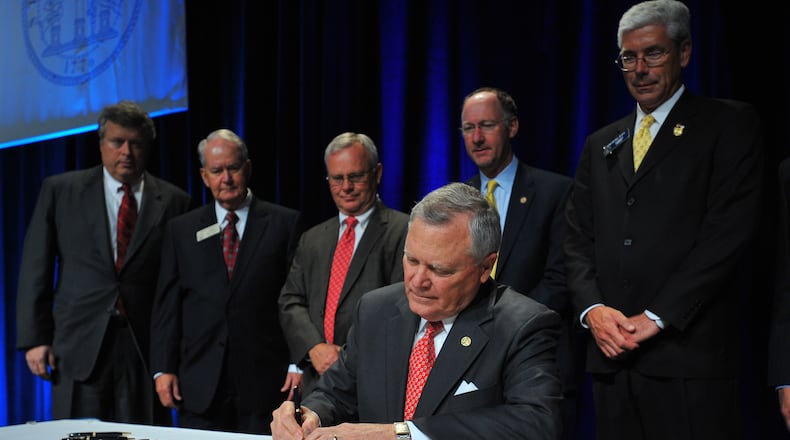The AJC is proud to offer this tool to track legislation and lawmakers at the Gold Dome. All bills are categorized by topic, and our reporters have highlighted legislation that will have the biggest public impact. Links to lawmakers will show bill sponsorship, recent votes, committee assignments and top campaign donors.
With one high profile veto on the way, Gov. Nathan Deal is getting closer to making decisions on the House and Senate bills sent to his desk at the end of the 2016 Legislative Session.
Deal has 40 business days, which started the Friday after Sine Die (Friday March 25), to veto or sign the legislation sent to his desk.
Here is a look at the 11 bills he vetoed after the 2015 legislative session and why he vetoed the bills.
This bill would have created a new state Adult and Aging Services Agency to cater to the Georgia’s growing elderly population. The governor vetoed it, saying the legislation attempts to merge two agencies with “diverse missions. He added that he wants to revisit the broader idea of restructuring the state Division of Aging Services.
This legislation would have would allow riders riding above sensors not sensitive enough to register motorcycles to treat lights like four-way stops. Deal vetoed the bill saying it was “confusing” for motorists.
3. HB 251: New charter for the City of Americus
The bill to provide a new charter for the City of Americus. In Deal’s veto statement, he said he vetoed the bill because the author, Mike Cheokas, R-Americus , requested it be vetoed as it doesn’t accomplish what Cheokas initially intended.
4. HB 439: New Market Tax Credit
This was one of the most controversial pieces of legislation that passed the General Assembly in 2015. The plan would have offered about $110 million in tax credits to investors who pump money into low-income communities and high-tech startups. Deal vetoed the bill saying the credits merit “serious discussion” but that the combination has too much of an impact on the budget.
5. SB 182: Community Improvement districts
The Senate bill would have allowed for the creation of one or more community improvement districts in Newton county. In his veto statement, Deal said the author of the legislation and the Newton County delegation of the General Assembly requested the bill be vetoed because there is an “error” within it.
6. HB 510: Sports Commission Fund
This bill would have created the Georgia Sports Commission Fund to help pick up the tab for a Super Bowl bid or a Little League tourney proposal. The governor vetoed the bill. He said there’s already a similar organization in place to fund sports bids, and that he sees a “lack of necessity” for the bill.
7. HB 524: Online business registry
This bill would have created a statewide registry of business trade names in the Georgia Superior Court Clerks’ Cooperative Authority. Deal said he vetoed this bill because it would have created an additional fee for businesses trying to join the online registry and he had “significant concerns” about where the money raised by that new fee would go.
8. HB 577: Rockdale's redevelopment powers
This bill would have authorized Rockdale County to exercise all redevelopment powers but the bill’s author requested it be vetoed because there was a wrong date in it.
This bill would have allowed the Recorder’s Court of Columbus to increase a technology fine from $15 to a $25. Deal said he vetoed the bill because a $25 fee is “excessive” when compared to other court technology fees in the state. He said he was concerned the fee increase would set “an unacceptable precedent for other similar courts.”
10. SB 215: Creation of a Schley County Utilities Authority
Deal said the author of the bill requested it be vetoed because the bill does not achieve what the author intended. SB 220, is actually the corrected version of this bill that allows for the creation of the Schley County Utilities Authority.
11. HB 651: Paulding Board of Education vcancies
This bill would have changed the way vacancies on the Board of Education were filled in Paulding County. The authors of the legislation asked Deal to veto the bill because the final version sent to his desk did not achieve what they intended.
About the Author
Keep Reading
The Latest
Featured



